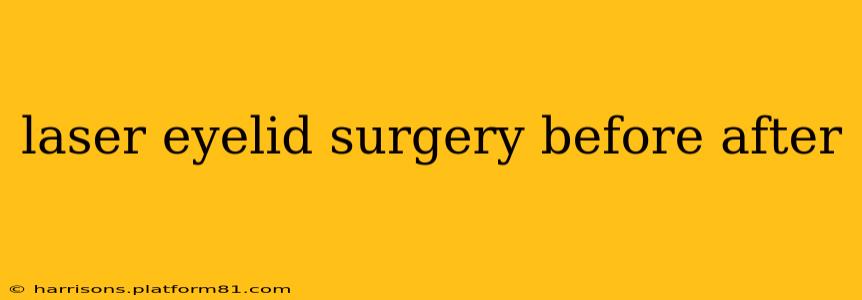Laser eyelid surgery, also known as laser blepharoplasty, is a cosmetic procedure designed to rejuvenate the eyelids by removing excess skin, fat, and muscle. This minimally invasive technique uses a laser to precisely target and reshape the tissues, resulting in a more youthful and refreshed appearance. Understanding the process, potential outcomes, and recovery is crucial before making a decision. This comprehensive guide will explore the before-and-after aspects of laser blepharoplasty, addressing common questions and concerns.
What Does Laser Eyelid Surgery Involve?
Laser blepharoplasty typically involves making small incisions along the natural crease of the upper eyelid and just below the lower lashes. A laser is then used to precisely remove excess skin, fat, and muscle. The laser's precision minimizes bleeding and reduces the risk of complications. This technique often results in smaller incisions and less visible scarring compared to traditional blepharoplasty. The procedure typically takes between 30 minutes to an hour, depending on the extent of the correction needed.
Laser Blepharoplasty Before & After: What to Expect
The results of laser blepharoplasty are generally noticeable immediately after the procedure. However, swelling and bruising are common and typically subside within a week or two. The final results are usually visible within several weeks, as the remaining swelling dissipates.
Before: You'll likely notice sagging or excess skin on your upper or lower eyelids, making you look tired or older than you feel. There may also be puffiness or bags under your eyes.
After: After laser blepharoplasty, you can expect:
- Reduced sagging skin: The procedure effectively tightens the skin around your eyes, leading to a more youthful appearance.
- Improved visibility: Excess skin can sometimes impair vision; blepharoplasty improves this.
- Minimized puffiness: Bags under the eyes are significantly reduced, providing a more rested look.
- Enhanced facial symmetry: It can address asymmetry or unevenness in the eyelids.
- Increased self-confidence: Many patients report a boost in self-esteem after the procedure.
It's crucial to remember that individual results vary depending on several factors, including age, skin type, and overall health.
How Long Does it Take to Recover From Laser Blepharoplasty?
Recovery time is typically shorter with laser blepharoplasty compared to traditional methods. Most patients can return to their normal activities within a week. However, strenuous activities and heavy lifting should be avoided for at least two weeks. Swelling and bruising usually resolve within a couple of weeks. Your surgeon will provide detailed post-operative instructions to ensure a smooth recovery.
What are the potential risks and complications of laser eyelid surgery?
As with any surgical procedure, there are potential risks and complications associated with laser blepharoplasty. These can include:
- Infection: Although rare, infection is a possibility. Proper post-operative care is essential to prevent this.
- Bleeding: Minimal bleeding is expected, but excessive bleeding is a less frequent complication.
- Dry eyes: Temporary dryness is common, but it usually resolves on its own.
- Temporary vision changes: These are generally short-lived.
- Scarring: The laser technique minimizes scarring, but some minor scarring is possible.
- Unsatisfactory cosmetic results: The results may not always meet individual expectations.
These risks are minimized with experienced surgeons and proper aftercare.
How much does laser eyelid surgery cost?
The cost of laser blepharoplasty varies depending on several factors, including the surgeon's fees, anesthesia costs, and facility fees. It's best to consult with a surgeon to get a personalized estimate.
Is laser eyelid surgery right for me?
Laser blepharoplasty may be a suitable option if you have excess skin, puffiness, or sagging around your eyelids that is bothering you. It's important to have a consultation with a board-certified plastic surgeon to discuss your goals and determine if the procedure is appropriate for you. They can assess your individual needs and help you make an informed decision.
What should I ask my surgeon before undergoing laser blepharoplasty?
Before committing to laser blepharoplasty, you should thoroughly discuss your expectations, medical history, potential risks and benefits, and any concerns you may have with your surgeon. This open communication is key to ensuring the best possible outcome.
By understanding the procedure, potential outcomes, and recovery process, you can make an informed decision about whether laser blepharoplasty is the right choice for you. Remember that consulting with a qualified and experienced surgeon is essential for achieving optimal and safe results.
